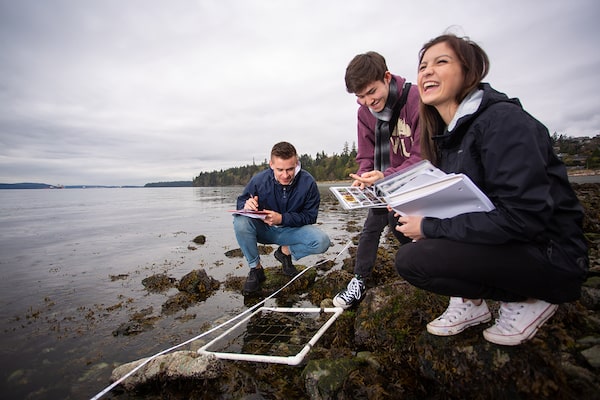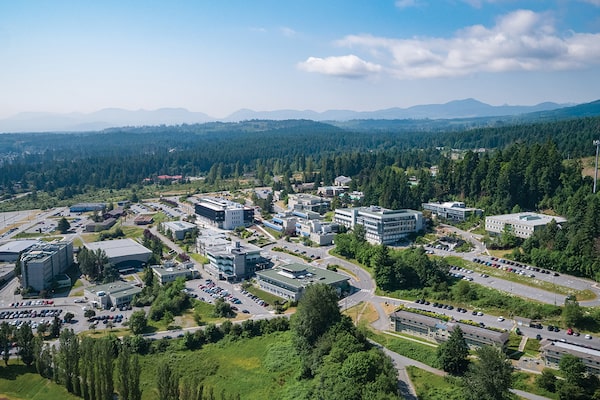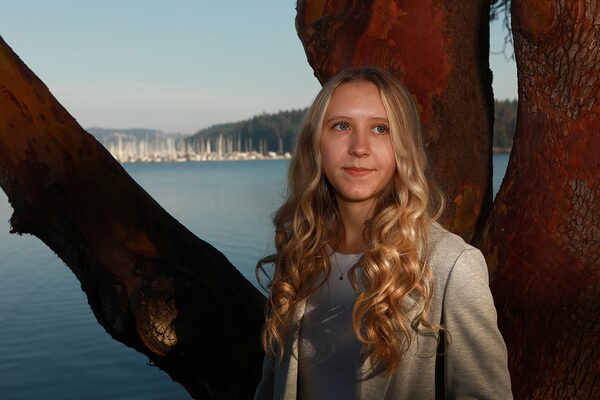
Students at Vancouver Island University engage in research projects outside of the classroom in the incredible mountain and coastal environment of Vancouver Island.Supplied
With an expansive view of the Salish Sea and surrounding cedar and Douglas fir forests, Vancouver Island University (VIU) in Nanaimo, B.C., is a force to be reckoned with when it comes to prime Canadian postsecondary institutions.
The diverse population of about 12,000 includes students from Vancouver Island, across Canada and worldwide. Its faculty consist of a host of notable researchers, including Canada Research and Innovation Chairs, B.C. Regional Innovation Chairs, Michael Smith Health Research BC Scholars, and other awarded and published academics.
VIU’s flourishing reputation, both regionally and internationally, is one reason the postsecondary institution is becoming a top choice for students searching for a rigorous and holistic learning experience.
The university’s main campus is located on the traditional territory of the Snuneymuxw First Nation. Elders-in-Residence from the Snuneymuxw, Kwakiutl, Tseshaht, Cowichan, Tla’amin and Métis Nations provide counselling, support and guidance to all students at VIU.
Our students want to solve the big problems. They’re coming to university to get a career and make the world a better place.
— Deborah Saucier, president and vice-chancellor of Vancouver Island University
You will often hear students referring to the Elders as “Auntie” or “Uncle,” which is a sign of affection and respect and is just one of the experiences VIU students cite as making their time at the school unique.
Others include the small class sizes, which allow students to get to know each other and the faculty, a close-knit student life, and a personalized approach from staff and faculty to help students become career-ready in the university’s areas of study – which range from trades and technical programs to undergraduate, postgraduate and graduate programs.
An outsized number of substantial research projects involving world-class faculty further enhances the VIU experience for many students.
“VIU’s strong research enterprise relies on the involvement of undergraduates, who, in turn, are making cutting-edge discoveries,” says Deborah Saucier, the university’s president and vice-chancellor and an award-winning neuroscientist. “I think that’s what makes us different.”
In 2021, nearly 2,000 students engaged in research projects, says Saucier, with faculty and students leading more than 200 projects involving community partners.

The main campus of Vancouver Island University. Its small student population and class sizes create a close-knit student life.Supplied
Engaging students in disciplines such as Indigenous studies, natural sciences such as biology, chemistry, forestry and aquaculture, sustainable tourism, community planning, arts and design and education, VIU consistently tackles “critically important social, economic and environmental issues” and is focused on creating graduates who help build healthy communities, says Saucier.
A small sample of the wide-ranging projects that students have been involved with include: researching ways to decolonize language; saving marine animals from rising ocean temperatures; optimizing trades training in a virtual environment; developing fast, inexpensive street-drug testing methods; and creating new ways to detect and monitor environmental contaminants.
Other projects focus on preparing cities for e-bike transportation; understanding neurological injuries resulting from domestic violence; resolving the global problem of antibiotic-resistant bacteria; and advancing psychedelic-assisted mental health therapies.
In addition, nine students have received undergraduate research awards from the Natural Sciences and Engineering Research Council of Canada (NSERC). In South Africa, a VIU student unearthed a two-million-year-old skull belonging to a human ancestor, making a valuable contribution to the study of evolution.
VIU students don’t have to wait until their third or fourth year of studies to get involved with research, which Saucier says is a significant advantage.
“The earlier and more frequently students are able to engage in research, the more profound their learning journey is,” she says. “Our students want to solve the big problems. They’re coming to university to get a career and make the world a better place.”

Fourth-year Vancouver Island University student Savannah Mercer started doing hands-on research in her second year. “The opportunity to apply what I’ve studied at VIU to real-world problems and situations has been rewarding and has helped shape my future goals,” she says.Chad Hipolito
Fourth-year student Savannah Mercer knows the benefits of having an early start to developing her research. As a chemistry student, Mercer started doing research in her second year with Dr. Heather Wiebe, a chemistry professor and the recipient of two NSERC awards – the Discovery Grant and Early Career Launch Supplement.
Working with Dr. Wiebe, Mercer is looking into pressure-resistance mechanisms of proteins in deep-sea organisms. These proteins can have practical industrial applications in food processing and pasteurization.
“The opportunity to apply what I’ve studied at VIU to real-world problems and situations has been rewarding and has helped shape my future goals,” says Mercer. “It’s opened so many doors for me and has allowed me the opportunities and experiences that I never thought would even be possible.”
Unsure of her path when she started at VIU, she intends to earn a master’s degree in computational chemistry and pursue a career in the field.
Haley Andersen also found a path to her future while participating in a VIU research project.
“I took biology courses just because I liked it in high school, but at VIU, I just loved the classes,” says Andersen. “It was really interesting spending so much time outside doing hands-on learning.”
Many of Andersen’s VIU biology labs took place just outside of the classroom, within the lush nature of the 90-acre campus in Nanaimo, while field trips took advantage of the incredible mountain and coastal environment of Vancouver Island.
The school’s additional three other island campuses – Cowichan, tiwšɛmawtx (Powell River) and Parksville-Qualicum Centre – as well as the Deep Bay Marine Field Station in Bowser and the Milner Gardens and Woodlands allow for even more opportunities to learn from the land.
Biology professor Dr. Jamie Gorrell, another NSERC Discovery Grant recipient, hired Andersen to research the Vancouver Island marmot, one of the most endangered species in the world.
Andersen tracked the daily movements of wild-born and captive-released marmots on Vancouver Island’s Mount Washington. This study was done in collaboration with the Marmot Recovery Foundation, which implants radio transmitters to monitor the survival and promote the conservation of the wild population.
After two seasons, Andersen’s data indicate captive-released marmots have larger home ranges than wild-born marmots. This knowledge will improve ongoing conservation efforts, and she plans to publish her discoveries in an academic journal to share with biologists studying other endangered species worldwide.
“I’ve learned so much working on this; it’s been amazing,” says Andersen, who is looking forward to a career in biology. “To have such a big role in a research project has been a really good opportunity for me as an undergraduate student.”
Both Mercer and Andersen say VIU’s small class sizes, which allowed them an easy connection with faculty, were crucial to their academic success.
“I feel like I’m part of a community,” says Mercer. “It’s a really supportive campus.”
Advertising feature produced by Globe Content Studio with Vancouver Island University. The Globe’s editorial department was not involved.